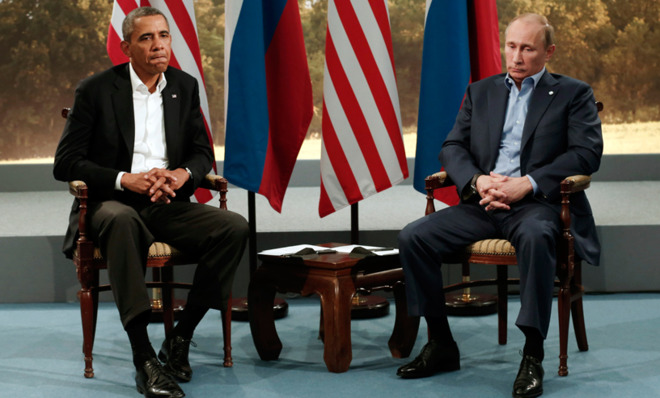Why America needs to think small to outsmart Russia
Stop swinging for the fences already

A free daily email with the biggest news stories of the day – and the best features from TheWeek.com
You are now subscribed
Your newsletter sign-up was successful

The Cold War is not over; it is taking a new shape. The new Cold War involves a one-sided competition in which only Russia actively competes. Meanwhile, America is gradually awakening to the reality of a world it had hoped was "yesterday's news." Unfortunately, The Tragedy of Great Power Politics has returned — if indeed it ever left. The truth is Russia never agreed to the post-Cold War rules; it just needed time to reassert its agenda.
America provided Russia that time by focusing on grandiose ideas instead of purposeful, incremental gains. In essence, its foreign policy elevated liberal "home runs" over a steady diet of realist "singles and doubles." This happened because national elites adopted mental models that included the "peace dividend" and a perspective that the universalization of Western liberal democracy was possible because the world had reached The End of History.
(More from Foreign Policy: Tsar Vladimir the First)
The Week
Escape your echo chamber. Get the facts behind the news, plus analysis from multiple perspectives.

Sign up for The Week's Free Newsletters
From our morning news briefing to a weekly Good News Newsletter, get the best of The Week delivered directly to your inbox.
From our morning news briefing to a weekly Good News Newsletter, get the best of The Week delivered directly to your inbox.
Subsequently, the United States conducted military interventions in Somalia, Haiti, Bosnia, Kosovo, Afghanistan, Iraq, and Libya — all for liberal ideals of democracy-promotion or humanitarian intervention. Arguably, the Persian Gulf War and less so Panama were the only interventions since 1989 in which the U.S. prioritized realpolitik concerns over liberal ideals throughout the mission's duration. Yet swinging for home runs has sometimes led to ambitious strategies whose political legacy is doubtful because it is highly dependent on forces beyond any nation's control. The current situations in Somalia, Iraq, and debatably in Afghanistan are cases in point.
As the United States pursued values, Russia has pursued interests. Recent events in Crimea and Ukraine, combined with Russia's 2008 Georgia invasion, demonstrate Russia's multi-faceted approach to reestablish regional hegemony against what it views as encroachment by the EU, NATO, and the United States. Diplomatically, Russia has vetoed U.N. Security Council resolutions to hold Assad accountable, proposed the deal to rid Syria of chemical weapons, conducted proxy propaganda campaigns, and strengthened its relationship with the other BRICS and Cuba. Militarily, Russia appears to be utilizing a revamped special operations force both in Crimea and in eastern Ukraine. Economically, Gazprom cut natural gas supplies to Ukraine over price and debt disputes. Further, the 30-year, $400-billion natural gas deal with China in May strategically outmaneuvered the United States and Europe, ensuring Russia stayed multiple chess moves ahead of potential rivals.
(More from Foreign Policy: The great security shift)
Our primary point, however, is not about Russian actions. Our argument is what Henry Kissinger argued in 1969: that American foreign policy is most effective when it balances U.S. interests with American ideals.
A free daily email with the biggest news stories of the day – and the best features from TheWeek.com
For instance, U.S. support for the coup that installed Pinochet as the Chilean leader in '73-'74 was consistent with American interests, but contrary to U.S. values. The U.S. humanitarian intervention in Somalia in '92-'94 was in line with American values, but not interests. Yet the alignment of national interests and values made U.S. intervention in the Persian Gulf War positive and powerful.
Swinging the foreign-policy pendulum back toward the nexus of interests and values does not mean that liberal ideals are devoid of merit. The U.S. role following WWII proved the worth of liberal values. Yet the last 13 years revealed the limits of power used in pursuit of liberal ideals. Freedom and democracy cannot simply be given to people. They must fight for it themselves and shape it to their historical and cultural traditions — albeit in some cases with American or international support. However, since the fall of the Soviet Union, the United States has had a propensity to interject itself at times when restraint might have been the more prudent course.
It's time for that to change; the United States must recognize the limits of what it can realistically achieve. Reassessment of American foreign policy is in order. The rebalance to the Asia-Pacific is a step in the right direction. So, too, is the strength of resolve not to "swing" just because we can.
(More from Foreign Policy: The social laboratory)
Long-term perseverance in this regard, however, involves breaking entrenched mental paradigms and transitioning from seeing the world through primarily an idealist lens to one that reasserts a realist perspective. Perhaps then the U.S. will regain the situational awareness it once had during the Cold War. One place to start is by fully integrating its military and interagency efforts, as advocated by a recent Atlantic Council Combatant Command Task Force report. This approach is proactive, coherent, and realistic. It also facilitates a strategically oriented foreign policy focused not on "home runs," but on "singles and doubles." This will incrementally provide positive returns over the long-term.
-
 6 exquisite homes with vast acreage
6 exquisite homes with vast acreageFeature Featuring an off-the-grid contemporary home in New Mexico and lakefront farmhouse in Massachusetts
-
 Film reviews: ‘Wuthering Heights,’ ‘Good Luck, Have Fun, Don’t Die,’ and ‘Sirat’
Film reviews: ‘Wuthering Heights,’ ‘Good Luck, Have Fun, Don’t Die,’ and ‘Sirat’Feature An inconvenient love torments a would-be couple, a gonzo time traveler seeks to save humanity from AI, and a father’s desperate search goes deeply sideways
-
 Political cartoons for February 16
Political cartoons for February 16Cartoons Monday’s political cartoons include President's Day, a valentine from the Epstein files, and more